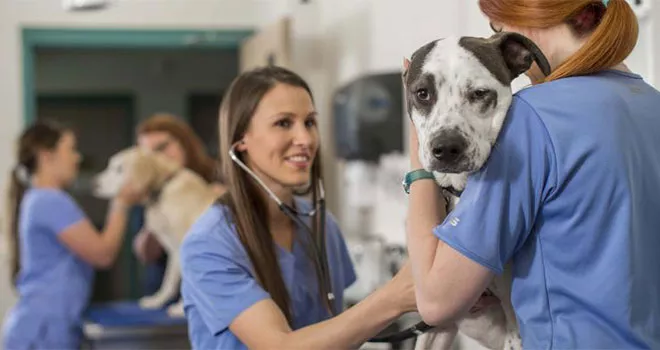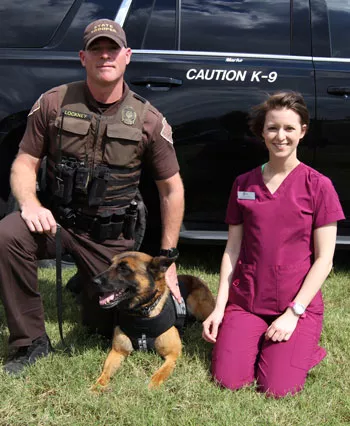Veterinary Technology, A.A.S.
Unlock your passion for animal care with our Veterinary Technology program. Become a vital part of the veterinary healthcare team.
About the Veterinary Technology Degree
Turn your love for animals into a rewarding career. TCC’s Veterinary Technology Program gives you the hands-on training and support you need to become a key part of a veterinary care team.
If you care about animals, enjoy learning new things, and want to help both animals and their people, this program could be a great fit. As a veterinary Technician, you’ll work with animals in clinics, hospitals, rescue centers, and more—making a real difference every day
Some of the skills you’ll learn include:
- Talking with animal owners and giving them helpful, compassionate information
- Understanding how animals’ bodies work and how to keep them healthy
- Providing nursing care and helping with procedures
- Running lab tests and taking images to help spot health problems
- Working well with a veterinary team and building leadership skills
This career offers strong benefits:
- Daily Variety: Work with many different animals—no two days are alike
- Purpose-Driven Work: Help animals and their families through difficult times
- Career Flexibility: Work in clinics, shelters, labs, nonprofits, and more
- High Job Demand: Veterinary technicians are needed now more than ever
Veterinary Technology Program Details
At TCC, our program is hands-on and focused on active learning. You’ll learn alongside instructors who care about your success and will help you build a strong foundation in veterinary nursing.
Employers value our graduates, and the skills you gain here can lead to a satisfying, long-lasting career with room to grow. If you’re ready to turn your love for animals into a profession, we’re here to help you take the next step.
This program is accredited by the American Veterinary Medical Association (AVMA). After you graduate, you’ll be ready to take the national exam (NVTE) and Oklahoma’s licensing exam. In Oklahoma, RVT licensing is handled by the State Board of Veterinary Medical Examiners (OSBVME).
Most Registered Veterinary Technicians and Nurses work for private veterinary practices, but jobs can be found in private and public research facilities, veterinary teaching hospitals, livestock production, veterinary supply and sales, zoos and exotic animal care, rescue and humane organizations, and even military service.
Veterinary Technician and Veterinary Nursing are high-growth occupations, which the U.S. Bureau of Labor Statistics forecasts to grow 15 percent from 2020 to 2030, faster than the average for all occupations.
After successfully completing this program, you will have the ability to:
- Apply knowledge of anatomy and physiology for appropriate patient care of a variety of animal species.
- Perform nursing care for a variety of animal species to include large, small, and laboratory animals and selected exotic species.
- Perform diagnostic support skills including radiology, clinical pathology, and microbiology.
- Accurately perform medical calculations.
- Perform appropriate office management and customer service skills important in managing a veterinary hospital.
- Accurately interpret doctor’s orders and provide safe and appropriate patient therapeutics.
As a veterinary nursing student, you will study a broad range of science-based courses, including anatomy, physiology, nutrition, small and large animal care, clinical laboratory science, dental care, and much more. View the Degree Requirements to find out which courses and credits you'll need to earn your degree.
We offer both a full-time curriculum and a part-time curriculum. Full-time students graduate in five semesters. An alternative part-time program (three years) is designed for students with significant work or family obligations that prevent them from attending as full-time students. Whether you choose the full-time or part-time track depends on your particular circumstances and goals. Explore the program map to see how you can complete your degree.
Essential Functions
All BIOL, CHEM, MATH, and VETT courses must be completed with a grade of “C” or better. Veterinary Technology (VETT) courses are offered on weekdays during the daytime. Students are required to perform some duties outside normal working hours.
Apply by April 30. TCC’s Veterinary Technology Program admits 30 students annually. Each new cohort starts every Fall semester.
We are looking forward to receiving your online application. Please contact the office with any questions or concerns at 918-595-8212. We are happy to help.
Application Procedures
- Information and Application Packet:
All applicants must first contact the Veterinary Technology Program office at 918-595-8212 or vettech@tulsacc.edu to obtain the information and application packet. - TCC Admission Application:
All applicants must apply to TCC, and submit their high school transcripts, ACT scores, and previous college transcripts by mail to the Office of Records, Tulsa Community College, 909 South Boston Ave, Tulsa, OK 74119, or email records@tulsacc.edu.- Once you are accepted to TCC, you will receive a student ID number and a TCC email account. All communication will be through your TCC email account. Acceptance to TCC does not guarantee admission to the Veterinary Technology Program.
- Apply to Program:
Submit a completed program application with the required materials by April 30.- Career shadowing at a veterinary hospital must be completed within six months prior to the Program application, or at the Program Director’s discretion. Shadowing information is available in the information and application packet. Submit your completed Shadowing form with your program application. Upload documents in DOCX or PDF format only.
- Incomplete submissions will not be considered for admission into the Veterinary Technology Program.
- Applicants must have a minimum overall GPA of 2.0 to be eligible for consideration.
- Interview:
Eligible applicants will be notified by email to their TCC email address as part of the admissions process. All interviewed applicants will be notified regarding their selection status. - Clearance:
Eligibility for admission to the Veterinary Technology Program requires clearance on a criminal background check, including sex offender registry, and drug testing.- Potential students will not receive full acceptance until clearance for both background checks and drug testing is received by the School of Health Sciences
- Medical marijuana and the use of illicit drugs and alcohol are not permissible in the School of Health Sciences and the Veterinary Technology Program
Conditions
Certification as a Registered Veterinary Technician may be prohibited under certain circumstances. If you have a felony conviction, a moral turpitude-related crime on your record, or struggle with substance abuse, you may not be eligible for licensure in Oklahoma. If any of these situations apply to you, we recommend contacting the Oklahoma State Board of Veterinary Medical Examiners.
It is important that you speak with the Veterinary Technology Program Academic Advisor, Amber Mullins. Amber is located on the Northeast Campus and you can email her at amber.mullins@tulsacc.edu.
If you do not have an assigned academic advisor, please email academicadvising@tulsacc.edu and we will connect you to an advisor remotely. Please inform them you are interested in the Veterinary Technology Program.
Attend a Smart Start Orientation Allied Health session when declaring a Health Sciences major. Register with your Academic Advisor through Starfish.
TCC's curriculum is tailored to fulfill pre-education requirements for licensure/certification in Oklahoma. While designed for state licensure exams, students considering other states should review relevant professional licensure disclosures and consult with the respective licensing board. State boards determine eligibility for licensure based on current rules when applying.
Explore our Professional Licensure Disclosures for comprehensive details on licensing requirements and certifications. Your informed career journey starts here.
The American Veterinary Medical Association accredits our Veterinary Technology Program. The Oklahoma State Board of Veterinary Medical Examiners regulates registered Veterinary Technician licensure. View the Professional Licensure Disclosure.
Program Contact
Program Director
Jan Barnett, DVM
918-595-8212
jan.barnett@tulsacc.edu
Veterinary Technology Program
vettech@tulsacc.edu
TCC West Campus
7505 W. 41st St.
Tulsa, OK 74107
918-595-7002
School of Health Sciences
healthsciences@tulsacc.edu

Careers in Veterinary Technology
Don't miss out on the opportunity to connect with our Career Services professionals. Schedule a session now to explore the comprehensive range of complimentary resources available for career planning and job preparation.

